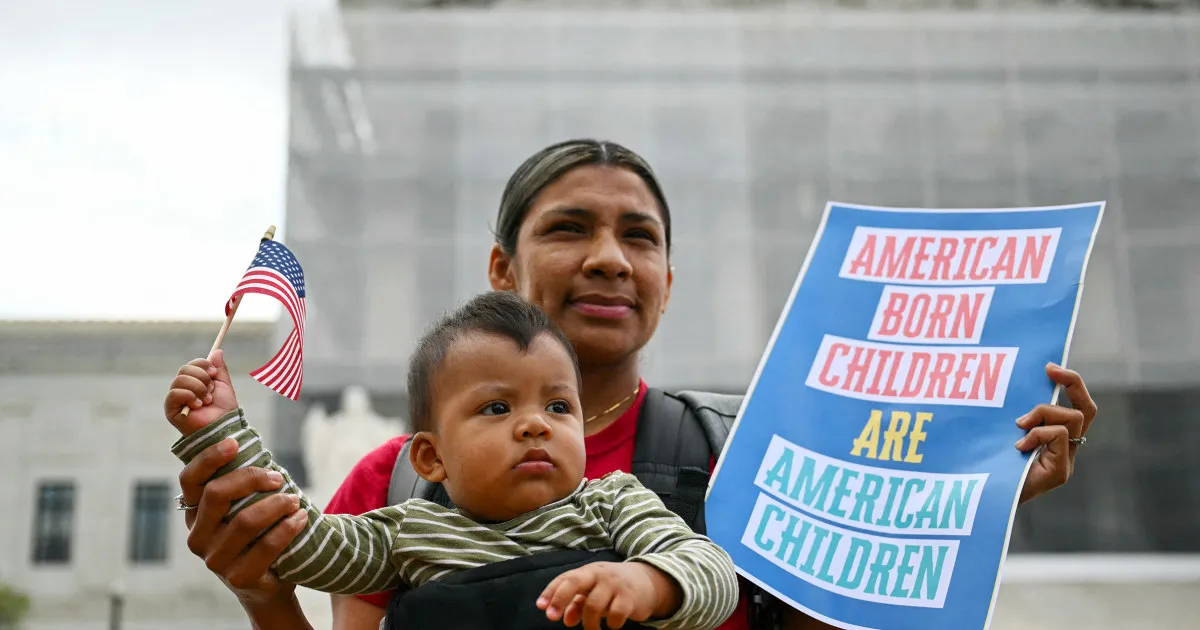
On Friday, the Supreme Court delivered a significant victory to the Trump administration by allowing the implementation of its controversial proposal to end automatic birthright citizenship. In a decisive 6-3 vote, the court approved a request from the Trump administration to limit the reach of nationwide injunctions imposed by various judges, restricting them to states, groups, and individuals that initiated the lawsuits. This ruling paves the way for the birthright citizenship proposal to advance, at least partially, in both the states that challenged it and those that did not.
The Supreme Court's decision showcased a clear ideological split, with the conservative justices forming the majority and their liberal counterparts dissenting. Justice Amy Coney Barrett, who wrote the majority opinion, asserted that when courts find the executive branch acting unlawfully, it is not their role to exceed their own authority. She emphasized that the scope of the nationwide injunctions should be limited to what is necessary, urging lower courts to quickly determine the appropriate breadth of these injunctions.
In stark contrast, Justice Ketanji Brown Jackson voiced her dissent, arguing that the ruling poses an existential threat to the rule of law. Fellow liberal Justice Sonia Sotomayor took to the bench to summarize her dissent, cautioning that no right is secure under the new legal framework established by the court.
While the Supreme Court's ruling allows for the proposal to move forward, it remains blocked in New Hampshire due to a separate lawsuit that is not under the court's jurisdiction. This means that the birthright citizenship proposal could potentially advance nationwide, although individual plaintiffs retain the option to file their own lawsuits in response to the ruling. Additionally, current challengers can still seek to reinstate more narrowly defined injunctions.
President Donald Trump's original executive order aimed to implement the birthright citizenship plan within 30 days but faced immediate legal challenges that halted its progress. Importantly, this decision does not delve into the legal merits of the proposal itself but focuses solely on the authority of judges to impose a nationwide hold on the plan.
The Trump administration and its supporters have been vocally critical of judges who have blocked various elements of Trump's agenda, including the birthright citizenship proposal. Historically, it has been widely accepted by legal scholars across the political spectrum that the 14th Amendment of the U.S. Constitution guarantees automatic citizenship to nearly everyone born on U.S. soil. The amendment states, “All persons born or naturalized in the United States, and subject to the jurisdiction thereof, are citizens of the United States.” The only recognized exception pertains to children of diplomats.
Trump's proposal seeks to redefine this longstanding interpretation, suggesting that citizenship should only be conferred upon those born in the U.S. to parents who are either U.S. citizens or permanent residents. This bold initiative, introduced on his first day in office, has faced immediate legal challenges, with every court ruling on the matter thus far blocking its implementation.
At the heart of the Supreme Court's deliberation were cases originating from Maryland, Massachusetts, and Washington State. In legal documents, former acting Solicitor General Sarah Harris argued that judges lacked the authority to issue nationwide injunctions and claimed that the states involved in the lawsuits did not possess legal standing. Notably, the Trump administration's plan has garnered support from 21 other states.
Justice Department officials have voiced their frustration over the numerous nationwide injunctions that have stymied Trump's assertive use of executive power, which has included escalated deportations, downsizing federal agencies, and significant staffing changes within the federal workforce. They argue that these rulings constitute an unconstitutional overreach against the president's authority. It is worth noting that previous administrations, regardless of party affiliation, have also faced challenges from such injunctions, which have become increasingly prevalent in contemporary legal disputes.